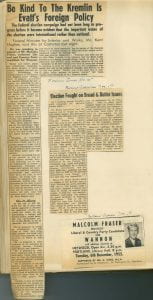“Bread & Butter issues” in the 1955 Wannon election: Malcolm Fraser and the Labor split
Timo Eckhardt

The Australian federal elections held on the December 10 1955 marked an important change in Australian politics that would endure for the next 23 years. The Labor party split into the Herbert Evatt Labor Party and the Robert Joshua Labor Party (Anti-Communist, and later called the Democratic Labor Party) This split dramatically divided votes for Labor politics and therefore rewarded a surging Liberal Party. Additionally this election marks the entry of John Malcolm Fraser into federal parliament and the start of a political trajectory that leads him to become one of the most iconic figures in Australian politics.
I have selected two news clippings about his election for the Wannon seat for the liberal party in 1955. Both of them address so-called “Bread & Butter issues”, that is, the social policies espoused by Fraser in response to Evatt’s proposed increases in spending to social programs leading up to the election by the Labor Party. In these two articles Fraser and Kent Hughes, the Federal Minister for Interior and Works point to the Liberal’s more conservative spending policy, discuss the importance of international politics, and attack the credibility of Evatt.
While these articles are seemingly narrow and local in focus, is there a strategy in play for the Liberal Party to make use of the Labor split in order to gain more votes, by highlighting the differences between Evatt and Joshua? Are they already aware that this discussion in the media could lead to a further divide for Labor which might also play on a fear of communism (both nationally and internationally)?
The first article, “Be Kind To The Kremlin Is Evatt’s Foreign Policy”, from the November 30. Edition of the Horsham Times is about a speech given by Hughes in support of Fraser. He contrasts the alleged overspending of the Labor Party’s social policies to the successes of the social reforms by the Liberal Party under Robert Menzies. However, maybe the most significant statements in this article are that he, himself working in interior politics, believes that international politics will be the deciding factor in this election, with the perceived closeness of Evatt to communism and communist countries, and Labor’s proposed cuts in military spending, regarded as important negative factors in the political climate of the Cold War.
The second article, “Election Fought on Bread & Butter Issues”, from the Portland Guardian December 1, is a transcript of a speech given by Fraser during his campaign in answer to the proposed social policies of Evatt. Prominently there is no reference to the policies or leadership of the Joshua Labor Party (although mentioned in an attack on Evatt). Maybe both these speeches deliberately target Evatt in an attempt to drive Labor voters away from him, and if not to the Liberal Party at least to Joshua, thereby cementing the Liberal’s position as the governing party under Menzies in 1955, and national political leadership until 1972.
Timo’s thesis is on Dynamic Epistemic Logics and their Proof Theory. Especially with a focus on extended model semantics. I am trying to incorporate a notion of lose of information akin to forgetting that is currently lacking in approaches used so far.
Una Fraser collection, University of Melbourne Archives, 2008.0058 unit 2
Leave a Reply